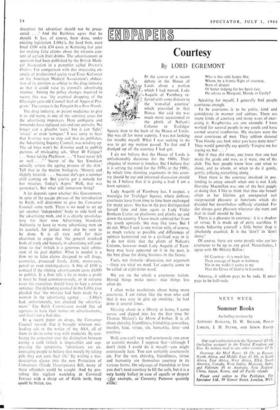Courtesy
fak
o.
By LORD EGREMONT
IN the course of a recent debate in the House of Lords about a motion 41/. which I had moved, Lady / kr. Asquith of Yarnbury re-
' ferred with some distaste to
'gb /7 the 'iron-clad courtesy'
. , ', which prevailed in that
)," House. She said she was
much more accustomed to the plinth of Nelson's
Column in Trafalgar Square than to the hush of the House of Lords. She was all for more asperity. I was not looking for trouble myself. What I was seeking to do was to get my motion passed. To that end I dredged up all the courtesy I had got.
I do not believe that the House of Lords is unfashionably decorous for the 1960s. Their elegance of manner is timeless. But I believe that it is setting the trend for the 1970s or the 1980s, by which time shouting arguments in this coun- try should be out and informed discussion should be in. I believe that it is giving a lead: I am a born optimist.
Lady Asquith of Yarnbury has, I suspect, a nostalgia for Trafalgar Square, where dubious courtesies have from time to time been exchanged for many years. She has in the past distinguished herself time and time again as Lady Violet Bonham Carter on platforms and plinths up and down the country:I have much admired her from my youth upwards. She may like rows. But I do not. What I seek is one nation with, of course, as much variety as possible and differences of opinion hammered out in a civilised way in it. I do not think that the plinth of Nelson's Column, however much Lady Asquith of Yarn- bury may have appeared on it in the past, is the best place for doing business in the future.
Facts, not rhetoric—discussion, not argument —these are what we need. Let asperity come to be called an eight-letter word.
We are on the whole a courteous nation. Horrid things make news: nice things less often do.
I often make resolutions about being more courteous. I am rather like the man who said that it was easy to give up smoking: he had done it several times.
Messing about in a library at home, I came across and dipped into for the first time Sir Thomas Malory's Le Morte d'Arthur. It is all about chivalry, friendliness, friendship, cowardice, murder, hate, virtue, sin, humanity, love—and courtesy.
Well, you can't very well courteously run away or commit murder. I suppose that—although I don't think I could do it myself—you might courteously hate. You can certainly courteously sin. For the rest, chivalry, friendliness, virtue and humanity are themselves courtesy in its various forms. On odysseys of friendship or love you don't need courtesy to fill the sails, but it is a very handy ballast in case of squalls or despair for example, ai Coventry Patmore quaintly wrote:
Who is this only happy She.
Whom, by a frantic flight of courtesy, Born of despair Of better lodging for his Spirit fair.
He adores as Margaret, Maude or Cecily?
Speaking for myself, I generally find people courteous enough.
To be courteous is to be polite, kind and considerate in manner and address. There are many kinds of courtesy and many ways of exer- cising it. Raspberries are one example. I have worked for several people in my youth and have earned several raspberries. My masters were the most courteous of men. They seldom shouted 'You bloody ass; look what you have done now I' They would generally say quietly 'Forgive me for saying so, but . .
But if they did shout, one knew that one had made the grade and was, as it were, one of the club. The best people know how and when to shout, and to whom, or when to do it gently, gently, jollying everything along.
Then there is the courtesy involved in pre- tending to enjoy oneself when one is not. Lady Dorothy Macmillan was one of the best peliple at doing that. I like to think that thus she herself often in her lifetime got unexpected and reciprocated pleasure at functions which she dreaded but nevertheless selflessly attended. For she always gave pleasure wherever she went and that in itself should be fun.
There is a pleasure in courtesy : it is a shadow of virtue. It is made up of petty sacrifices. It means behaving yourself a little better than is absolutely essential. It is the 'don't' in 'don't shove.'
Of course, there are some people who are 'too courteous to be up to any good. Nevertheless, I
agree with Mr Hilaire Belloc : 1 Of Courtesy—it is much less Than courage of heart or holiness; Yet in my walks it seems to me That the Grace of God is in Courtesy.
Anyway, it seldom pays to be rude. It never pays to be half-rude.






























 Previous page
Previous page